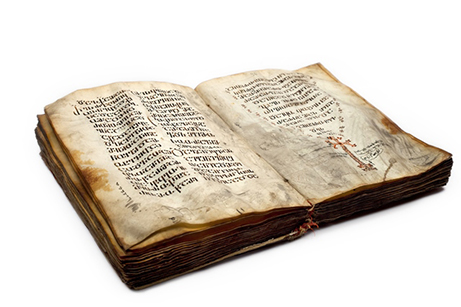Rare Georgian manuscripts added to UNESCO historical archive

A handful of the earliest preserved Georgian manuscripts have been selected to feature in a UNESCO historical database for their "world significance and outstanding universal value”.
Eight items of Georgian secular and ecclesiastic literature, dating from the 4-15 Centuries AD, were accepted into the UNESCO Memory of the World Register earlier this month when UNESCO experts gathered to discuss new additions to the list.
Between October 4-6 in Abu Dhabi it was decided the eight Georgian manuscripts and 39 other collections and documents from around the world would be added to the UNESCO Memory of the World Register, from a submission of 88 items from 61 countries.
The historical Georgian items are preserved at the National Archives of Georgia in capital Tbilisi. To celebrate the addition of these documents to the international database, visitors are invited to see the ancient writings in a one-day display in the venue’s Exhibition Hall tomorrow.
The documents include a 9th Century AD version of the Christian gospel completed in the oldest Georgian script Asomtavruli. This manuscript is considered to be one of the most precious items of Georgian literature preserved in archives around the world.
Other writings added to the UNESCO list were 10thCentury AD Georgian translations of Psalms and secular manuscripts featuring a unique system of musical notes and scrolls with several layers of script, each from different time periods.

A liturgical lectionary complete in Asomtavruli was among the Georgian manuscripts added to the UNESCO Memory of the World Register. Photo from National Archives of Georgia.
The National Archives of Georgia said the items were chosen because they were unique at illustrating the history of secular and religious literacy in Georgia and the country’s links to international cultural hubs of various eras.
UNESCO’s decision to accept new additions to the list was the result of a long process spanning two years. The organisation reviewed the 88 submitted items over the past two years before drawing up the final list of documents accepted in 2015. The items from Georgia were submitted for review last year.
The UNESCO Memory of the World Register currently featured more than 300 collections and documents from around the world.
The archive’s material from Georgia included Description of the Georgian Kingdom and Geographical Atlas by 18thCentury Georgian historian and geographer Vakhushti Bagrationi, a manuscript collection of the iconic Georgian medieval poem Knight in the Panther’s Skin by Shota Rustaveli and Georgian Byzantine manuscripts containing information on Byzantine culture not preserved in other languages.
The UNESCO Memory of the World Register was established in 1992 as an effort for the preservation of the world’s documentary heritage. The first Georgian submission to the collection was made in 2011. As of today Georgia has 12 historical writings or manuscripts included on the list.
Since the list’s creation UNESCO has established a number of national committees around the world. Vice chairman of the program’s International Advisory Committee Lothar Jordan travelled to Georgia earlier this year to meet Georgian National Archives general director Teona Iashvili to discuss the prospects of establishing a Georgian committee for the program.
 Tweet
Tweet  Share
Share